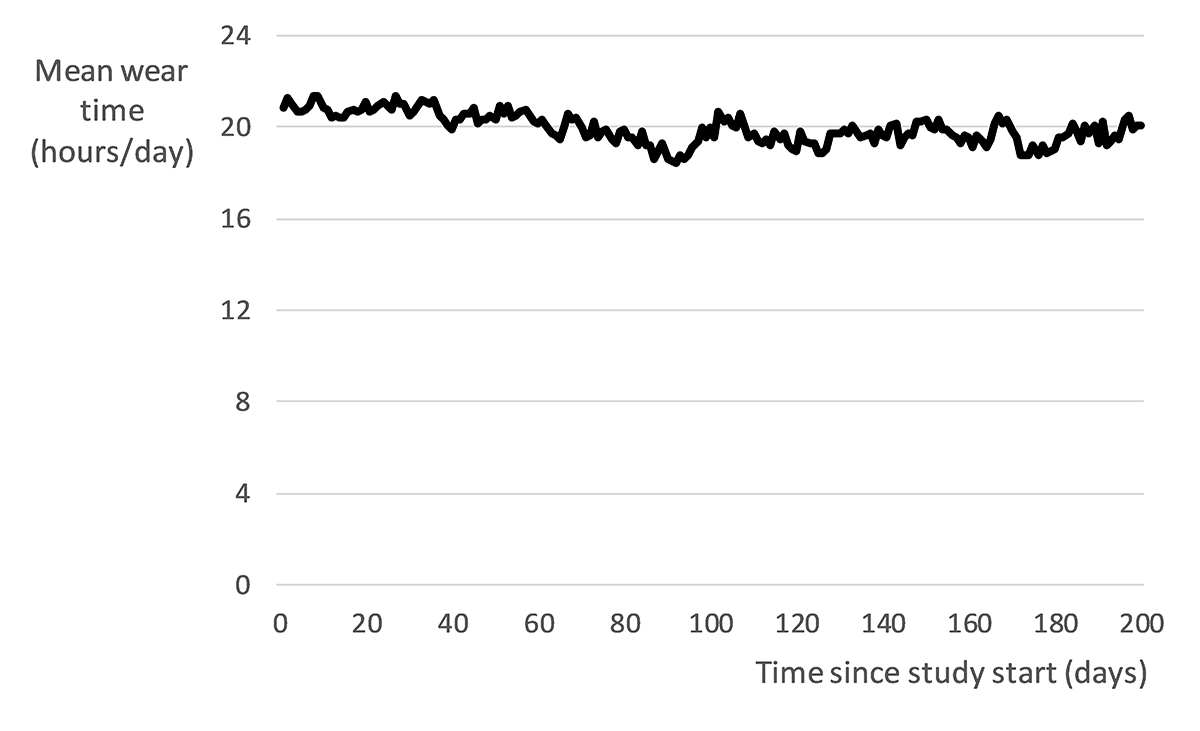Session Information
Date: Tuesday, September 24, 2019
Session Title: Parkinsonisms and Parkinson-Plus
Session Time: 1:45pm-3:15pm
Location: Agora 3 West, Level 3
Objective: We assessed long-term participant engagement with a multi-sensor watch for continuous daily life monitoring among people with Parkinson’s disease.
Background: Wearable sensors can potentially provide valuable insights into real-life symptoms and function with minimal impact on daily life. For longitudinal deployment, maximizing data completeness and minimizing patient attrition is essential.
Method: The Personalized Parkinson Project is a single-center cohort study that is enrolling 650 persons with Parkinson’s Disease (diagnosed <5 years) for two years. In addition to annual in-clinic visits, participants wear a wrist-worn device (the Verily Study Watch) for up to 23 hours per day for two years. The Study Watch continuously collects various types of physiological and environmental data. During charging (around one hour per day), data are transferred to a secure cloud via a cellular internet connection. No other interaction with the watch is required; the screen simply displays the time and date. Device use is encouraged by education before study entry, in-person instructions at study start, and a helpdesk for troubleshooting. Individual wear time is monitored on an ongoing basis, with proactive support provided to those with suboptimal wear times. Participants are kept up-to-date on study progress via regular newsletters.
Results: Currently 225 people have been enrolled (age 62.4±8.8 [mean±SD] years, 66.2% men, MDS-UPDRS part III off score 20.7±7.9). The mean wear time of the Study Watch for all participants across the entirety of their study participation is 20.8 hours/day, resulting in a cumulative total of over 1 million hours of sensor data thus far. In participants who have been enrolled for at least 200 days (n=104), wear time is stable over time [figure1]. Three participants dropped out, one related to Study Watch use. In an online survey (n=159), 73% indicated it was pleasant to wear the watch, 5% thought it was unpleasant, and 22% responded neutrally.
Conclusion: It is feasible to achieve stable, high wear times with a multi-sensor watch in the context of a large Parkinson’s cohort study, even without provision of individual data back to participants. Probable facilitators are high wearing comfort and ease of use of the device, as well as personal support and positive attitude towards the study’s objectives and technology used.
To cite this abstract in AMA style:
L. Evers, R. Kapur, T. V.D. Zande, M. Meinders, B. Bloem, W. Marks, JR.. Long-term adherence with wearing a multi-sensor watch in the Personalized Parkinson Project [abstract]. Mov Disord. 2019; 34 (suppl 2). https://www.mdsabstracts.org/abstract/long-term-adherence-with-wearing-a-multi-sensor-watch-in-the-personalized-parkinson-project/. Accessed February 27, 2026.« Back to 2019 International Congress
MDS Abstracts - https://www.mdsabstracts.org/abstract/long-term-adherence-with-wearing-a-multi-sensor-watch-in-the-personalized-parkinson-project/

